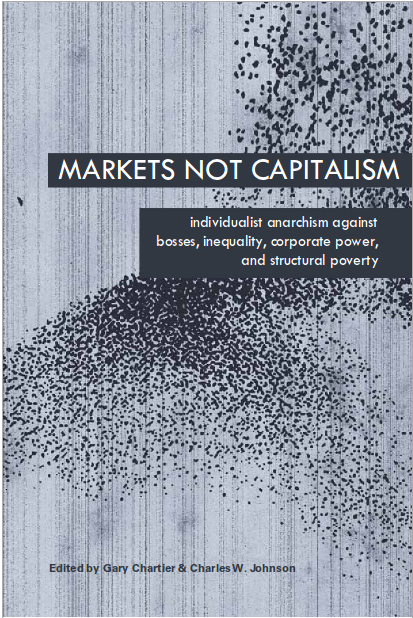Gary Chartier, Charles W. Johnson (eds.): Markets Not Capitalism: Individualist Anarchism Against Bosses, Inequality, Corporate Power, and Structural Poverty (2011)
Filed under book | Tags: · activism, anarchism, capitalism, communism, economics, economy, market, neoliberalism, protest, revolution, socialism

Individualist anarchists believe in mutual exchange, not economic privilege. They believe in freed markets, not capitalism. They defend a distinctive response to the challenges of ending global capitalism and achieving social justice: eliminate the political privileges that prop up capitalists.
Massive concentrations of wealth, rigid economic hierarchies, and unsustainable modes of production are not the results of the market form, but of markets deformed and rigged by a network of state-secured controls and privileges to the business class. Markets Not Capitalism explores the gap between radically freed markets and the capitalist-controlled markets that prevail today. It explains how liberating market exchange from state capitalist privilege can abolish structural poverty, help working people take control over the conditions of their labor, and redistribute wealth and social power.
Featuring discussions of socialism, capitalism, markets, ownership, labor struggle, grassroots privatization, intellectual property, health care, racism, sexism, and environmental issues, this unique collection brings together classic essays by leading figures in the anarchist tradition, including Proudhon and Voltairine de Cleyre, and such contemporary innovators as Kevin Carson and Roderick Long. It introduces an eye-opening approach to radical social thought, rooted equally in libertarian socialism and market anarchism.
Publisher Minor Compositions, an imprint of Autonomedia, November 2011
ISBN 978-1-57027-242-4
440 pages
PDF (added on 2014-12-22)
Scribd
Kate Holbrook, Ann S. Kim, Brian Palmer, Anna Portnoy (eds.): Global Values 101: A Short Course (2006)
Filed under book | Tags: · activism, economy, ethics, journalism, law, mass media, moral theory, politics, religion, sociology, war, women
![]()
Global Values 101 grew out of one of the most popular courses ever offered at Harvard University, in which some of the most original thinkers of our day sat down with students and explored how ideas have made them-and can make us-more engaged, involved, and compassionate citizens. In these engrossing, essay-length interviews, which address the topics of war, religion, the global economy, and social change, Amy Goodman, host of the popular radio program Democracy Now, speaks about the role of the independent media as gatekeeper and witness; Lani Guinier, author of Tyranny of the Majority, reveals that students’ SAT scores more accurately describe the kind of car their parents drive than the grades they will earn in college and shows the way to a more equitable college admissions system; Howard Zinn, author of A People’s History of the United States, explores the American Dream and exposes the myth of the “good war”; economist Juliet Schor, author of Born to Buy and The Overspent American, explains why Americans are willing to sacrifice quality of life to attain financial success; former “mall rat” Naomi Klein, author of No Logo: Taking Aim at the Brand Bullies, urges readers to go global while fighting global conglomerates; and Katha Pollitt, author of Reasonable Creatures: Essays on Women and Feminism, employs her incisive wit to explore what it really means to be a feminist in the Twenty First century.
For anyone who has been moved by idealism and longed to become a more proactive citizen, this collection offers a range of stories on how progressive ethics can inform, inspire, and ultimately transform lives.
Publisher Beacon Press, 2006
ISBN 0807003050, 9780807003053
276 pages
Derek Wall: Babylon and Beyond. The Economics of Anti-Capitalist, Anti-Globalist and Radical Green Movements (2005)
Filed under book | Tags: · activism, anarchism, anti-capitalism, autonomy, capitalism, ecology, economics, economy, marxism, social movements, socialism

Babylon and Beyond provides the first clear and accessible guide to the economics of anti-capitalism. Anti-capitalism is a diverse movement: critics accuse it of knowing what it is against, but not knowing what it is for. Anti-capitalists want radical change, but what shape should that change take? The truth is that different sections of the movement advocate distinct—sometimes complementary, sometimes contradictory—programmes for change. This book concentrates on perhaps the most divisive issue of all in the anti-capitalist struggle: how to transform the economy. There are greens who think we must hold back economic growth and Marxists who believe the economy must move forward along capitalist lines before there can be revolutionary change; there are those who remain faithful to notions of collective or state ownership of all aspects of the economy, and those who think various kinds of reform or regulation of capitalist practice is more appropriate. Babylon and Beyond is a modern guidebook to the complicated terrain of alternatives to global capitalism. Derek Wall explains and summarises the rich variety of theories available within the anti-capitalist movement. Chapters cover Marxism, Autonomism, Anarchism, Ecosocialism, Capitalist reformers (like George Soros and Joseph Stiglitz), Green localists (like Colin Hines), and others. Unique in its coverage, clear and accessible, the book is ideal for activists, and anyone who is trying to find a useful way forward. This book is published in association with the Green Economics Institute.
Publisher Pluto Press, 2005
ISBN 074532391X, 9780745323916
232 pages
PDF (updated on 2014-8-28)
Comment (0)
